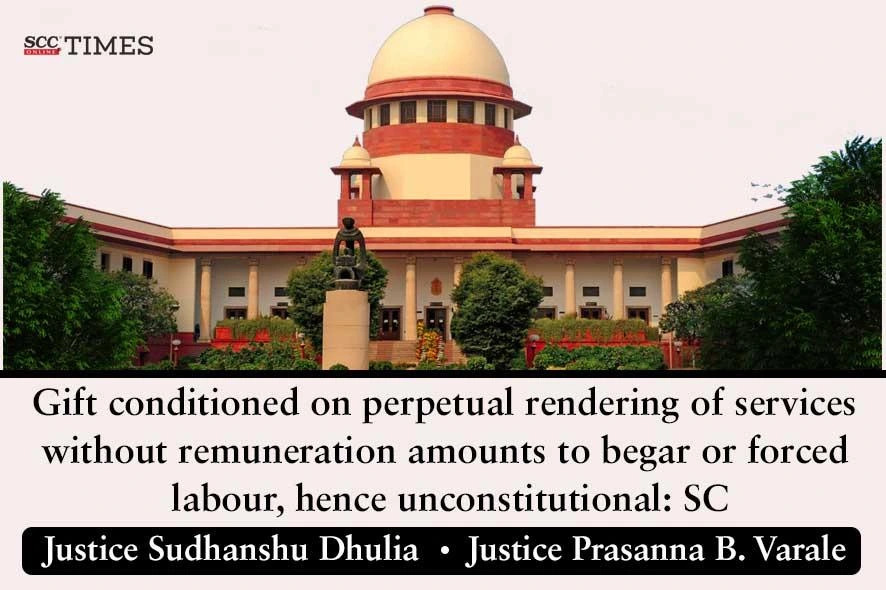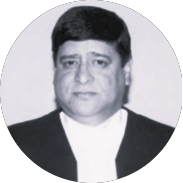Supreme Court: In a civil appeal against Punjab and Haryana High Court’s decision whereby the second appeal of the respondents / defendants / donees against the decision of the Trial Court wherein, the suit property was directed to be reverted to the plaintiffs/ donor’s heir, was allowed and the concurrent decisions of the Courts below, which had decreed the suit, were set aside, the Division Bench of Sudhanshu Dhulia and Prasanna B. Varale, JJ. upheld the High Court’s decision viewing that the plaintiffs had no case.
While dismissing the appeal, the Court observed that perpetual service conditions without remuneration as in the gift deed are unconstitutional and amount to forced labor.
Factual Matrix
The suit land was gifted by donor to three sons of X- A, B, and C (‘donees’) in 1953. The oral gift was duly executed, and mutation was carried out in favour of the donees on 13-12-1953. The possession of this land was also given to the donees on 13-12-1953. In 1998 a suit was filed by the plaintiffs for declaration and for possession, or more precisely for resumption of this property claiming that they are the heirs of the erstwhile donor and that the suit land was gifted in lieu of the services, which had to be rendered by the donees and their heirs to the donor and his heirs lifelong. Since the defendants stopped rendering these services and the original donees died, the suit land should revert to the plaintiffs in terms of the gift condition.
The Trial Court concluded that what was crucial was that the subject matter of the gift was only a life interest in suit land and since the services were stopped, the land was liable to be reverted in favour of the plaintiffs. The First Appellate Court agreed with these findings and dismissed the defendant’s appeal. The High Court though allowed the defendant’s second appeal and dismissed the suit, largely on the ground of limitation, though it was, also observed that nowhere in the mutation dated 13-12-1953 was mentioned that the donees/ defendants had to serve the heirs of the donor as well and it could be presumed that proper services were rendered to the donor during his lifetime.
Analysis and Decision
The Court pointed out that the transaction which is the subject matter of the dispute admittedly occurred in December 1953, this was the period immediately after independence where each State in the country had already framed or was in the process of framing legislations on land reforms with a focus on redistribution of land. The big zamindars were fully conscious that they would not be able to retain land beyond the ceiling fixed by the Statute. Therefore, they were either gifting their land to their helpers, agricultural workers, even to priests or to temples, or in any other manner where they thought their best interest would lie.
Regarding the question of long delay by plaintiffs in seeking resumption of the suit property, the Court said that it is a settled position of law that in cases of resumption of land or immovable property where there has been long and uninterrupted possession by the defendants, strong evidence is required to be placed by the plaintiffs to set up a claim, when the plaintiff is seeking a decree of possession. The Court said that the plaintiff’s entire case rests on the proposition that their predecessors-in-interest gifted the suit property to the forefathers of the defendants with the condition that the land is being given to them so that they continue to provide lifelong services to the donor as well as to their descendants, and since the services were discontinued, the land was liable to revert to the descendants/legal heirs of the original donor/ plaintiffs. The Court added that this proposition was not backed by any plausible evidence.
The Court referred to Forbes v. Meer Mahomed Tuquee, 1870 SCC OnLine PC 21 wherein the Privy Council dealt with a similar case and held that grantees had enjoyed peaceful possession of land for a long period of time and they were in long cultivation of the suit land, and hence, the agreement was construed in such a manner that the gift was “…partly as a reward for past, partly as an inducement for future, services.” Similarly in the present case, the Court said that the gift was for past services but even if it is assumed that it was for some past and some future services, there was no occasion for the defendants to render the services as the plaintiffs had left the village and now, when defendants have been enjoying peaceful possession of land for long, resumption of land in favour of plaintiffs will not be justified.
The Court upon noting that the Mutation Deed had a default clause, i.e., “if the donee refuses to render services in that case the land shall revert to the donor or to his heirs”, stated that merely incorporating a defeasance clause will not exempt the plaintiff from discharging his burden. The Court added that the plaintiff must satisfy the Court and lead evidence to show the exact ‘nature of the services’ agreed upon, that a demand for these services was communicated and that the defendants refused to render the services.
Further, the Court added that though the Transfer of Property Act, 1882 was not applicable to Punjab but as established in various cases, the broad principles in TPA based onequity, justice and good conscience, would definitely be applicable and Section 122 based on one of such principles which defines gift as – the transfer of certain existing moveable or immoveable property made voluntarily and without consideration, by one person, called the donor, to another, called the donee, and accepted by or on behalf of the donee. Acceptance when to be made.—Such acceptance must be made during the lifetime of the donor and while he is still capable of giving. If the donee dies before acceptance, the gift is void.
Testing the transfer made in 1953 on basis of all the essentials of gift, the Court pointed out that the subject matter of transfer was an immovable property (land), and it was without any consideration. There was also an acceptance of this gift deed by the donees, when the donor was alive, as possession of this land was given the very same day to the donees and this undisputed fact was on record.
The Court added that in cases governed by Hindu Law, possession is an extremely important ingredient where validity of the gift is to be determined. Hence, the Court added that since TPA was not in force, delivery of possession which was done in the present case had an important bearing. The Court added that in the matter at hand, it was admitted that the defendants were in peaceful possession of the suit land since the date of gift.
The Court observed-
“Although Section 127 of TPA permits an onerous gift but a gift which is conditioned upon perpetual rendering of services without any remuneration would amount to a “begar” or forced labour, even slavery and therefore it is not just wrong or illegal but even unconstitutional, being violative of fundamental rights of the donees. It has to be remembered that this so-called rendering of “services”, was to be in perpetuity. It has to go on forever. What would this be, if not “begar” or forced labour. We must also remember that when the gift deed was executed the Constitution of India had already been enforced. Article 14 and 21 and more particularly Article 23 prohibits forced labour.”
Therefore, the Court viewed that, the condition as read by the plaintiffs where not only the donees but their successors were to continue giving services to the plaintiffs, that too indefinitely, was ‘forced labour’, as a condition. However, regarding the question that whether the gift itself would be void, the Court answered no as the validity of the gift was never ever questioned, either by the plaintiffs or by the defendants.
CASE DETAILS
|
Citation: Appellants : Respondents : |
Advocates who appeared in this case For Petitioner(s): For Respondent(s): |
CORAM :




